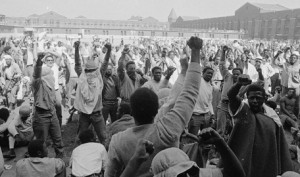Attica Prison Uprising – Day 2 (Sept 10, 1971)
September 10, 1971: Uprising continues. 33 observers assemble at Attica and pay a brief visit to D yard.
A SCENE FROM INSIDE ATTICA PRISON…September 10, 1971
From A Time to Die by Tom Wicker (1975) P.96-98
But Wicker’s impatience vanished as Brother Flip took the microphone and began to speak, even though Flip’s was the same message that had been spoken so often already – men in prison were still men entitled to be treated by other men like men, not as animals or numbers. But the conditions of prison life, of Attica, made it impossible for them to be treated as human beings. That was what the uprising was about, Flip said, that was what the world should understand.
The same message, but different. Wicker could feel, as could the other observers, its gathering power as Flip talked on almost conversationally. He was different from any of the speakers who had preceded him – soft-spoken where most of them had been ranting, persuasive as against their brute force, eloquent in a more learned and sophisticated way. Brother Flip seemed an educated man with a high sense of drama. Wicker speculated that he might have been an actor on the outside; where else could he have found the style to wrap himself in a blanket as if it were the toga of a Roman senator? He had a thin, sensitive face adorned with an elegantly trimmed mustache. His head was quite bald in the glaring lights. When he gestured, his long, expressive fingers underlined his relatively quiet words.
Flip moved toward a peroration as expertly as any politician Wicker had heard on the stump – better than most. D-yard was silent, listening; the bonfires flickered on the walkways. Beyond the linked men of the security chain, the mass of the brothers surrounding the dark circle of hostages were still upon the ground or in their makeshift tents.
“We no longer wish to be treated as statistics, as numbers,” Flip cried, his voice rising in volume and intensity, but so controlled as to reinforce Wicker’s belief that he was a professional actor. “We want to be treated as human beings.” Then, sharp as the crack of a rifle: “We will be treated as human beings!”
The brothers were “not advocating violence,” Flip said. “We are advocating communications and understanding.” He mentioned Soledad, Kent State, Jackson State. Attica was not different; the brothers of Attica were calling only for what “oppressed people are advocating all over the world…We do not want to rule, we only want to live.” Then, the long arms, the sensitive fingers, swept wide to include the observers raptly listening at the table. “But if any of you gentleman own dogs…” the voice fell to a dramatic whisper, “you treating them better than we are treated here.”
Scattered applause and yells broke the silence but quickly died, as if most of the brothers realized that Flip was about to reach for the highest, most demanding note. “So we have come to the conclusion…after close study…after much suffering…after much consideration…” In silence so deep that his voice rang back from the surrounding walls, Flip was marching to the inevitable point, taking his listeners with him so that they knew before the words came what they would have to say: “That if we cannot live as people, then we will at least try to die like men!”
The brothers erupted, long-held breaths burst forth in a shattering roar, a thunder of voices carrying out at once – as much in joy, Wicker suspected, as in actual defiance, because he did not believe men cheered the thought of their own deaths, in whatever cause. He could well remember Lurleen Wallace explaining to him what she believed was the source of George Wallace’s popularity in the South, and elsewhere. “He speaks out for the people. He’s not afraid to say what they think. When he’s on ‘Meet the Press’ they can listen to George and think, ‘That’s what I would say if I were up there.’
So it was with these men, who would not cheer more than any others for the idea of dying, but who would cheer getting it said, as Flip had said it, for all of them, for at least that one time – getting it said to the world that in the ultimate and unavoidable act of humanity, in the limitless brotherhood of dying, if in no other way, they would be men no less and no more than any others.
Flip stood motionless, as they cheered and fell silent. He was standing on one side of the table, the microphone in his hand, the toga flowing from his shoulders, when suddenly he leaned forward and across the table, the light gleaming from his bald, dark head.
“Brother Kunstler!” he cried, the microphone and his head thrust near that of the lawyer seated across from him. “What did they do with you in court?”
Kunstler was still for a moment, in the renewed, breath-drawn silence of the yard. Perhaps he was recalling the Chicago Seven, Judge Hoffman’s courtroom, Bobby Seale in chains, the contempt sentence hanging over his own head. Then, like a woman surrendering to a lover, he rose, his glasses pushed up on his forehead into his long hair, and threw his arms around Flip. There was pain and rapture in Kunstler’s face, in his voice, as he cried out, “The same thing they did with you, Brother!”
The two men embraced, and once again there were cheers. Then, releasing himself, Flip said quietly to the observers, “I want to thank all of you beautiful people for coming here. Stand with us now…walk with us…die with us, if necessary…”

